
Brazilian filmmaker Petra Costa’s latest documentary, Apocalypse in the Tropics, explores the impact of evangelical Christianity on Brazil’s political landscape. Once a small minority, evangelicals now constitute about 30% of Brazil’s population and played a key role in the rise of former far-right President Jair Bolsonaro. “It’s one of the fastest-growing religious shifts in the history of mankind,” Costa tells Democracy Now! She says right-wing evangelicalism in Brazil is largely a U.S. import, after Washington sought to undermine the influence of left-wing Catholic teachings during the Cold War.
U.S. President Donald Trump on Wednesday threatened to impose 50% tariffs on Brazil, partly as retribution for what he calls the “witch hunt” against Bolsonaro, now facing trial in Brazil for an alleged coup attempt following his defeat in the 2022 presidential election to Luiz Inácio Lula da Silva.
Apocalypse in the Tropics is available on Netflix starting July 14. Costa’s previous film, The Edge of Democracy, was nominated for an Academy Award for Best Documentary Feature.
Transcript
AMY GOODMAN: This is Democracy Now!, democracynow.org, The War and Peace Report. I’m Amy Goodman, with Nermeen Shaikh.
NERMEEN SHAIKH: President Trump issued a new wave of tariff threats on Wednesday. Twenty-two countries now have until August 1st to make a deal or face levies of at least 20%. The steepest tariff threat is against Brazil at 50%, partly as retribution for what Trump calls the “witch hunt” against former President Jair Bolsonaro. Bolsonaro is currently facing trial in Brazil for his alleged participation in a coup attempt following his electoral defeat in 2022 to Luiz Inácio Lula da Silva, the current president. In a letter announcing the tariffs, President Trump calls the trial an “international disgrace” and says, quote, “This Trial should not be taking place. It’s a Witch Hunt that should end immediately,” unquote. President Lula da Silva responded by rejecting what he called “interference or threats” by the United States.
AMY GOODMAN: For more, we’re joined now by Oscar-nominated Brazilian filmmaker Petra Costa, who’s made two films about Brazilian politics. She was nominated for an Oscar for the film The Edge of Democracy. Her new documentary, that is being released by Netflix next week, but she’ll be at the Paris Theater in New York tonight, traces the rise of Christian nationalism and evangelism in Brazil and its power in politics. This is the trailer for Apocalypse in the Tropics. We’ve added English voices over, where needed, for our radio listeners.
PETRA COSTA: This city was designed as a vision of Brazil’s future. And the cement that held it together was a faith, not in God, but, instead, in the equally abstract ideas of progress and democracy.
PROTESTERS: [translated] God, homeland, family and freedom!
SILAS MALAFAIA: [translated] I want to be a pastor of a generation that will change history.
PETRA COSTA: In the last 40 years, evangelicals have grown from 5% to more than 30% of Brazil’s population, a rapid religious shift molded into an unprecedented political force.
EVANGELICAL BRAZILIAN: [translated] What really influences my vote is my religion.
SILAS MALAFAIA: [translated] We are the absolute majority in this country!
LUIZ INÁCIO LULA DA SILVA: [translated] What made socialism fail was denying religion.
SILAS MALAFAIA: [translated] With truth, we’re building a new politics in Brazil.
Bolsonaro likes talking to me because I’m frank with him.
JAIR BOLSONARO: [translated] Brazil above everything. God above everyone!
SILAS MALAFAIA: [translated] That’s democracy!
PETRA COSTA: [translated] But democracy isn’t just the will of the majority. It’s also protection of the minorities.
SILAS MALAFAIA: [translated] Democracy is the absolute majority’s will!
LUIZ INÁCIO LULA DA SILVA: [translated] He’s turning the church into a political pulpit.
SILAS MALAFAIA: [translated] Here, we’ll destroy them.
UNIDENTIFIED: [translated] Freedom of speech isn’t freedom to attack. Democracy isn’t anarchy.
PETRA COSTA: [translated] What will happen to Brazilian democracy?
SILAS MALAFAIA: [translated] The Brazilian nation is living a new moment.
AMY GOODMAN: The trailer for Apocalypse in the Tropics.
For more, we’re joined by its director, Petra Costa. She is a Brazilian filmmaker and actress.
So, this film hits at a pivotal time, as President Trump goes after Brazil every which way, for hosting the BRICS summit with Lula in the lead to this trial that’s taking place. And Bolsonaro is also at the center of this film, as well as the rise of evangelicals in Brazil — a lot of remarkable parallels to the United States, Bolsonaro known as the “Trump of the Tropics.” Can you talk about who Bolsonaro is, this attempted coup, and where this whole religious backing comes from?
PETRA COSTA: Yes. So, Bolsonaro was a congressman when I made my film The Edge of Democracy, which we spoke about here, Amy, a few years ago. He was one of the most far-right congressmen, who was defending the military dictatorship, declared his vote against Dilma at the time, defending the torture of Dilma Rousseff.
AMY GOODMAN: This is Dilma Rousseff, the president.
PETRA COSTA: The first female president of Brazil. Then he decided to run for president, and did not have the working-class vote in the beginning. He gained that by declaring himself somewhat evangelical, making an alliance with the pastor who’s the protagonist of our film, Malafaia, Silas Malafaia, a prominent televangelist. And in this marriage between religion and politics, Bolsonaro was very useful for a growing movement in Brazil, that comes from the United States, which I — it’s called dominion theology, that has as a plan the takeover of the three branches of government — the judiciary, the legislative and the executive.
We had the chance of filming with Malafaia, this pastor, during the last five years. And during that time, what was fascinating to see was his power over the president only grew. And Bolsonaro became a vessel, an instrument, to executing this dominion theologist plan, which is very similar to what is happening in the United States with Trump and his allies, such as Mike Huckabee, Peter Hegseth. And —
AMY GOODMAN: And Huckabee, very significant. He is now the U.S. ambassador to Israel. And the last actions of Netanyahu in the United States yesterday, the Israeli prime minister, were to meet with the evangelical Christians of the United States supporting him in Israel.
PETRA COSTA: And in this film, we also trace the origin of this evangelical, apocalyptic and sometimes Zionist thought that believes that waging war in the Middle East will accelerate the second coming of Christ, a fascinating theology that is really shaping our geopolitics at this moment and is very understudied for its relevance. The film is an investigation into that, into how this apocalyptic theology is shaping Brazilian politics at this moment and really making our elections become less a discussion of programs, of plans for the future, but holy wars.
NERMEEN SHAIKH: And, Petra, you do — in the film, I mean, you take also like a historical look. It’s not just about what’s happened immediately. You document, for example, the visit of the American evangelist Billy Graham, who came to Brazil, I think, for the first time in 1960 and was met by massive audiences. So, if you could talk about that? What was the appeal he had then? I mean, we’re talking about 70 years ago, right? Sixty, over 60 years ago. And how that movement built from then?
PETRA COSTA: Well, Brazil had — is one of the greatest Catholic nations in the world. And in the '60s and ’70s, a movement called liberation theology was growing and had many thoughts about social justice, of empowering the poor and the oppressed in Brazil. But that movement was encountered with much antipathy by the likes of Kissinger and also the lobbying group The Family, also known as The Fellowship in the United States, which thought, as part of the Cold War project, it was interesting to send evangelical missionaries to Brazil against the alleged communist threat. Billy Graham went to Brazil. The dictatorship decided to show his cult, his rally or service in the Maracanã, the biggest stadium in Brazil, in all channels at the time. Evangelicalism grew since then. When I was born in the ’80s, it was 5% of the population were evangelical. Today they're 26% of the population. It’s one of the fastest-growing religious shifts in the history of mankind. And it’s not problematic at all, and it’s actually delivering social services and spiritual help and psychological help to many of Brazilians. And faith is something that we can’t talk about, and there’s no reason to interfere or to discuss people’s faith, only when it decides to have a plan that will basically erode our democracy and one of the greatest achievements of modern society, which is the separation of church and state.
AMY GOODMAN: As we wrap up — and we’re going to do Part 2 and put it online at democracynow.org — these latest developments, Trump saying drop the trial of Bolsonaro for attempting a coup — interestingly here, the attempted coup, as many people describe, it was January 6th; in Brazil, it was January 8th — or they’ll be slapped with — you’ll be slapped, your country, with 50% tariffs. In this Part 1 of the discussion, just wrap up with your response to that.
PETRA COSTA: Our film really traces these coup attempts that Bolsonaro waged during the four years of his presidency, when he said he would never recognize the results of the elections if he lost, and the January 8th attacks, which were very much inspired by the January 6th attacks. The relationship between Trump and Bolsonaro is not new. They’ve been exchanging — they have been exchanging with Bannon — Bolsonaro’s son Eduardo left his seat in office in the parliament and went — came to the United States to lobby for his father, who is currently on trial for the coup attempt that, if was successful, the plan was to assassinate Lula, his vice president and the Supreme Court justice. So, Brazil has to finish this trial. Our courts are independent. And Bolsonaro, as any citizen, has the right to a fair trial, but without foreign interference.
AMY GOODMAN: Well, we’re going to leave it there now. I also want to talk after the show, in our web exclusive, about your fascinating interview with Lula, having coffee with him, talking about the rise of the evangelicals in Brazil. Petra Costa is the Oscar-nominated, Peabody Award-winning Brazilian filmmaker and director of the new film, Apocalypse in the Tropics, next week on Netflix. Her previous film, The Edge of Democracy. Tonight, she’ll be at the Paris Theater in New York City.
Next up, an update on the new U.S. sanctions against Francesca Albanese, the U.N. special rapporteur on human rights in the Palestinian territory, the occupied Palestinian territory. We’ll also speak with her about her new report, “From economy of occupation to economy of genocide.” Stay with us.
[break]
AMY GOODMAN: “Freedom Is Free” by the Los Angeles band Chicano Batman, performing at our Democracy Now! studio.

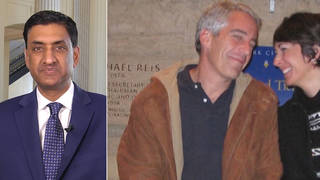
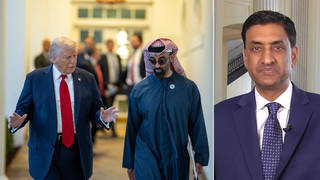
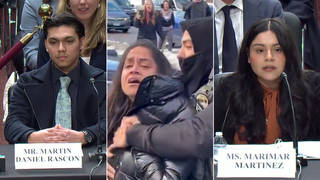
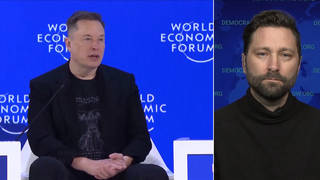






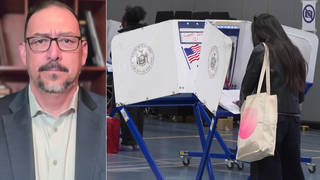
Media Options